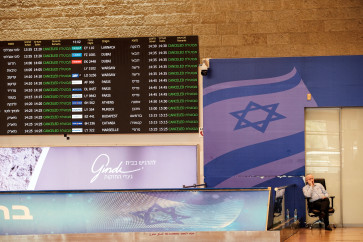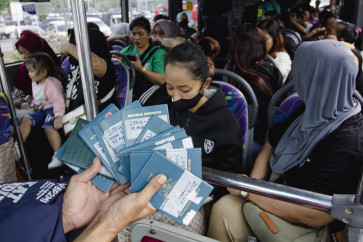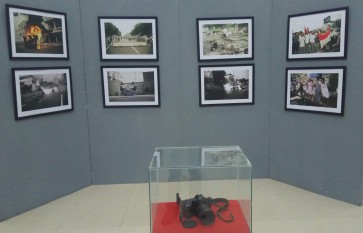Popular Reads
Top Results
Can't find what you're looking for?
View all search resultsPopular Reads
Top Results
Can't find what you're looking for?
View all search resultsFarm provides pastoral sanctuary
Farm life: A worker unloads goat feed from a truck at Moloka Farm in Parung, Bogor regency
Change text size
Gift Premium Articles
to Anyone
 Farm life: A worker unloads goat feed from a truck at Moloka Farm in Parung, Bogor regency. The farm is located on the private property of the Pandjaitan family, which plans to open the farmâs pavilion to the public in August. (Courtesy of Moloka Goat Milk) (Courtesy of Moloka Goat Milk)
Farm life: A worker unloads goat feed from a truck at Moloka Farm in Parung, Bogor regency. The farm is located on the private property of the Pandjaitan family, which plans to open the farmâs pavilion to the public in August. (Courtesy of Moloka Goat Milk) (Courtesy of Moloka Goat Milk)
F
span class="caption" style="width: 597px;">Farm life: A worker unloads goat feed from a truck at Moloka Farm in Parung, Bogor regency. The farm is located on the private property of the Pandjaitan family, which plans to open the farm's pavilion to the public in August. (Courtesy of Moloka Goat Milk)
The combination of lush greenery, large fish ponds and the sound of chirping birds and cicadas makes Moloka Farm Living resemble a classic pastoral village. Such an environment has become a thing of the past, however, in the concrete jungle of the capital city.
Around a one-hour drive from Lebak Bulus in South Jakarta or 15 minutes from Parung Market in Parung, Bogor, the family owned farm boasts a big wooden pavilion and a menagerie of animals, such as fish, dozens of Etawa goats, hundreds of chickens and a flock of ducks.
A highlight at the farm are the Etawa goats, which first attracted the attention of Jakartans to the 7-hectare farm. Dairy products and goat-milk soap have been available for sale for several years now.
'It all began in 2011, when an agribusiness consultant introduced the species' potential to my father [Huntal Pardomuan Pandjaitan]. He bought 100 goats,' Esterlyta Pandjaitan, Huntal's youngest daughter, told The Jakarta Post recently.
When she returned to Indonesia in 2012 after studying in Canada, she began experimenting with goat milk to produce natural soap. Previously, her family had only sold the milk to a cheese factory in Pasar Rebo, East Jakarta.
Esterlyta, who is fondly called Lyta by her family, said she decided to produce goat-milk soap, knowing that it was a premium product sold at farmers' markets in Canada. Her personal motivation was simple: She loved the soap's moisturizing properties.
'Personally, I don't like using body lotion, so if there's a bar of soap that offers long-lasting moisturizing benefits, I'll choose that,' she said.
Armed with books purchased from online retailer amazon.com, Lyta started researching natural soap production and how to make the soap from scratch. After months of failure, she managed to produce the texture and quality that she wanted and offered the first batch of soaps to her friends.
The first milestone for her homemade product was when she joined the so-called Craft Day in Kedai Tjikini restaurant in Cikini, Central Jakarta. She sold all 16 bars of goat-milk soap that she had.
'People in Indonesia are familiar with goat-milk soap, but the packaging and marketing strategies are still poor. In Bali, for example, people only buy natural soap as a souvenir, while ignoring its true benefits,' Lyta said, adding that goat-milk soap was good for dry and sensitive skin.
In an effort to promote the soap and the farm, Lyta has given a number of workshops at various craft events across the capital. She also markets the product using a Facebook page called Moloka Moloka.
Lyta's sister, Rumiris Pandjaitan, said their whole family was involved in developing the farm.
'One of our sisters loves cooking. She produces soft cheese from the goat milk. Meanwhile, I channel my enjoyment of gardening into selecting decorative plants to don this farm,' she said.
She said they had also designed a pavilion using teak from their own trees, adding that it would be opened to the public in August to coincide with her parents' wedding anniversary.
The love for nature that runs in the young women's blood apparently comes from their parents. Their father, Huntal, first started buying plots of land in Parung to practice his farming hobby after being transferred from Samarinda in East Kalimantan to Bandung, West Java, by the state company he worked for in the late 1970s.
He raised chickens and fish as well as planted productive plants, such as oranges, papayas and cassavas on a part-time basis. Once he retired, however, he devoted all his time to the farm.
'I still remember using my college breaks to weigh and pack chicken meat to be sent to Gelael supermarkets,' Rumiris said.
Lyta, who works as a freelance consultant for telecommunication companies, said the farm in Parung gave the entire family a reason to get excited when they had some free time on the weekend or a holiday.
In June, they have been preparing to offer the same excitement to others by launching a soft opening of Moloka Farm Living.
'We want to see the farm host our goat-milk soap workshops and other farming workshops. We are still considering whether to open the farm to the public but for now, it remains private property that is available for rent for activities such as yoga or meetings,' Lyta said.









